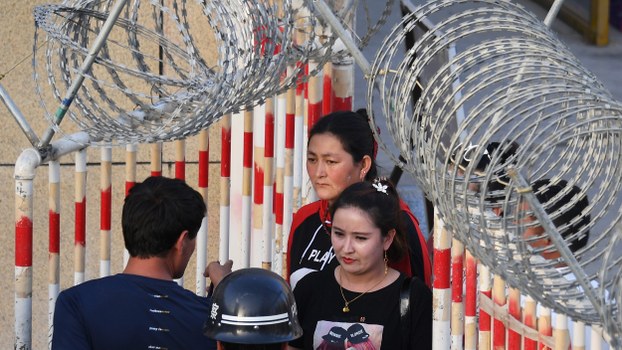China’s system of extrajudicial internment camps for Uyghurs and other Muslims in the Xinjiang Uyghur Autonomous Region (XUAR) last year may meet the definition of “crimes against humanity,” a U.S. congressional advisory panel said in its annual report, released Wednesday, as lawmakers expressed hope that legislation to hold Beijing accountable for human rights violations will soon become law.
During its 2019 reporting year, covering the period from August 2018 to August 2019, the Congressional-Executive Commission on China (CECC) detailed severe rights abuses in the XUAR’s camp system, where authorities are believed to have held some 1.8 million Uyghurs and other Muslim minorities since April 2017, as well as how China’s increasingly heavy hand in Hong Kong encroaches on that city’s promised autonomy.
“Security personnel at the camps subjected detainees to torture, including beatings; electric shocks; waterboarding; medical neglect; forced ingestion of medication; sleep deprivation; extended solitary confinement; and handcuffing or shackling for prolonged periods,” the report said.
Other forms of mistreatment in the camps included restricted access to toilet facilities, punishment for behavior deemed religious, forced labor, overcrowding, deprivation of food, and political indoctrination, the report said, while noting that some detainees reportedly died in the camps due to poor conditions, medical neglect, or other reasons.
“Scholars and rights groups provided a strong argument, based on available evidence, that the ‘crimes against humanity’ framework may apply to the case of mass internment camps in the XUAR,” the report said.
The report said that China’s arbitrary detention of Uyghur, Kazakh, and other ethnic minorities in mass internment camps; the torture of detainees in the camps; the targeting of specific minority groups; and forced disappearances of hundreds of intellectuals meet definitions laid out in Rome Statute of the International Criminal Court, which lists acts that may constitute “crimes against humanity.”
While Beijing initially denied the existence of the camps, China last year changed tack and began describing the facilities as “boarding schools” that provide vocational training for Uyghurs, discourage radicalization, and help protect the country from terrorism.
But reporting by RFA’s Uyghur Service and other media outlets indicate that those in the camps are detained against their will and subjected to political indoctrination, routinely face rough treatment at the hands of their overseers, and endure poor diets and unhygienic conditions in the often overcrowded facilities.
The CECC said that authorities reportedly placed the children of detainees in orphanages and other facilities, despite the willingness of relatives to care for them, “raising concerns of forced assimilation” into majority Han Chinese culture.
The commission also highlighted China’s increasing use of advanced technology and information to control and suppress its citizens, most notably in the XUAR.
“Outside the camps, the Chinese government and [ruling Communist] Party have created a pervasive and high-tech surveillance system in the XUAR that some observers have called an ‘open-air prison’” to form an “Orwellian policing platform” that allows authorities to tighten their control over Uyghurs and other minorities in the region, it said.

